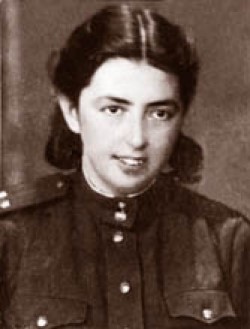Bella Tsukerman was born in 1920 in Kharkov, in Ukraine. From the mid-1920s until 1931 her father served as a vice-president of Amtorg (the first Soviet trade organization in the United State, that was established in 1924). Thus, Bella spent her childhood in the New York City, where she attended school and gained a command of English. In 1931 Bella's father was recalled to the Soviet Union, where he was arrested. Despite this family stigma, in 1939 Bella was admitted to the faculty of history of Moscow University, where she studied until the beginning of the Soviet-German war in June 1941.
While she was at university, Bella also completed studies at a military nursing school, which was quite a logical thing to do under the conditions of war hysteria prevalent in the Soviet Union of the late 1930s. In the summer and fall of 1941, she worked as a nurse at a military hospital in Moscow and submitted several requests to serve on the frontlines. She was sure that she would be accepted as a nurse or, if not, as a communications specialist. However, to her surprise, Bella was drafted into the Red Army and sent to the Riazan infantry school. There she chose to become a machine-gunner. Her course lasted eleven months. As Tsukerman recalled: "They trained us without any special consideration given to us as women. We were forced to go on 20-kilometer night marches carrying a machine gun, with a barrel that weighed 10 kilograms and a frame with wheels, that weighed 16. All this plus a rolled up overcoat and other equipment."[1]
After graduating from the Riazan infantry school, Tsukerman was assigned to a reserve womens' brigade serving in the vicinity of Moscow. She found the atmosphere unbearable there, with women commanding women. Bella asked to be transferred to active army service in a regular regiment where men were serving. She was assigned to a rifle regiment as the commander of a machine-gunner platoon. Shortly after that, she was wounded. After her release from hospital, she was assigned to be the head of a medical battalion. There Bella was once in a female environment.
During the following two years, Bella served as a paramedic. She took part in battles in the Baltics, in Poland, and in Prussia. The number of wounded who required treatment was great. In August or September 1944, in Estonia she took part in combat. Tsukerman recalled:
"When we were stationed in Tartu, in a former tuberculosis sanatorium, a message arrived by telephone: the sanatorium was being encircled by the Germans. A perimeter defense had to be organized. I was doing this for the first time and shaking with fear, but I succeeding in setting up our firing positions and, for two days, we fought, accompanied by the moaning of the wounded."[2]
In May 1945, due to her knowledge of English Bella Tsukerman was ordered to go to Boizenburg, a town in northern Germany located on the border between the Soviet and British occupation zones. Bella served as a translator during negotiations between the Soviets and the British. During the negotiations the British gave in to the Soviet demand that they hand over the Soviet POWs whom the British had liberated from German POW camps. Later Tsukerman served as a translator at the Allied Kommandatura, the governing body of Berlin. She recalled that when General Eisenhower was leaving his post in the fall of 1945, he had a farewell party, at which he invited her to dance ("I was the only woman in military uniform there" she noted, along with the fact that the General praised her English).[3]
After the war Bella graduated from Moscow University. However, she could not find work for a long time since this was at the peak of the Stalin's postwar anti-Jewish campaign. From 1964 to 1990, when she retired, she was a member of the editorial staff of the Soviet English-language newspaper "Moscow News."







